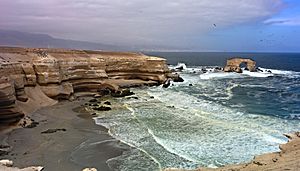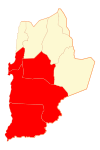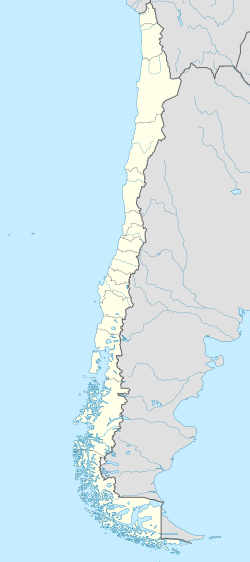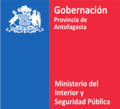Antofagasta Province facts for kids
Quick facts for kids
Antofagasta Province
Provincia de Antofagasta
|
|||||
|---|---|---|---|---|---|

La Portada
|
|||||
|
|||||
| Country | |||||
| Region | |||||
| Capital | Antofagasta | ||||
| Communes |
List of 4:
|
||||
| Government | |||||
| • Type | Provincial | ||||
| Area | |||||
| • Province | 67,813.5 km2 (26,182.9 sq mi) | ||||
| Population | |||||
| • Province | 359,353 | ||||
| • Rank | 1 | ||||
| • Density | 5.299137/km2 (13.724701/sq mi) | ||||
| • Urban | 313,244 | ||||
| • Rural | 5,535 | ||||
| Sex | |||||
| • Men | 165,847 | ||||
| • Women | 152,932 | ||||
| Time zone | UTC-4 (CLT) | ||||
| • Summer (DST) | UTC-3 (CLST) | ||||
| Area code(s) | 56 + 55 | ||||
| Website | Government of Antofagasta | ||||
Antofagasta Province (Spanish: Provincia de Antofagasta) is one of three provinces in northern Chile. It is part of the Antofagasta Region (II). The main city and capital is Antofagasta, which is a port city.
This province is located in the Atacama Desert. It shares borders with the El Loa and Tocopilla provinces to the north. To the west, it meets the Pacific Ocean, and to the south, it borders the Atacama Region.
Contents
History of Antofagasta Province
For a long time, the area where Antofagasta Province is now was claimed by both Chile and Bolivia. In 1866, a treaty was signed, and the area became part of Bolivia. It was known as the Atacama Department.
Later, in 1879, the War of the Pacific began between Chile, Peru, and Bolivia. Chile won this war, which ended in 1884. During the war, Chile took control of the Antofagasta region.
After the war, Antofagasta was managed by Chile. In 1904, Bolivia officially gave the area to Chile in a peace treaty. This made Antofagasta a permanent part of Chile.
Geography and Resources
Antofagasta Province is a very large area, covering about 67,813 square kilometers (26,183 square miles). It is the second largest province in Chile. Most of the province is covered by the Atacama Desert.
The land here is very rich in minerals. You can find important deposits of silver, copper, lead, and nitrate. There are also borax, salt, iron, and manganese ores. These minerals are very important for Chile's economy.
People and Towns
In 2012, about 359,353 people lived in Antofagasta Province. Most of these people, about 98%, live in cities and towns. Only a small number live in rural areas.
The population of the province grew quite a lot between 1992 and 2002. The main city is Antofagasta, which is also the capital. Other important towns in the province include Taltal and Mejillones.
How Antofagasta Province is Managed
Antofagasta is a province, which is a type of administrative division in Chile. It is divided into four smaller areas called communes. A person called the Presidential Provincial Delegate is in charge of the province. This person is chosen by the president of Chile.
The main office for the province's government used to be in Antofagasta city.
Communes of Antofagasta Province
Here are the four communes that make up Antofagasta Province:
| Commune | Area (km2) | 2002 Population |
Density (km2) |
Government website |
|---|---|---|---|---|
| Taltal | 20,405.1 | 11,100 | 0.5 | link |
| Sierra Gorda | 12,866.4 | 2,356 | 0.2 | link |
| Mejillones | 3,803.9 | 8,418 | 2.2 | link |
| Antofagasta (Capital) |
30,718.1 | 296,905 | 9.7 | link |
| Province | 67,793.5 | 318,779 | 4.7 | link |
Images for kids
See also
 In Spanish: Provincia de Antofagasta para niños
In Spanish: Provincia de Antofagasta para niños
 | Emma Amos |
 | Edward Mitchell Bannister |
 | Larry D. Alexander |
 | Ernie Barnes |







